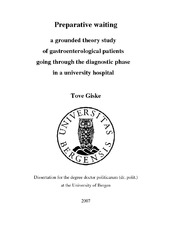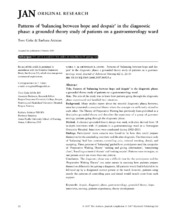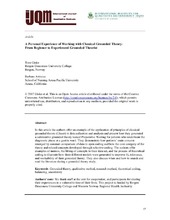| dc.contributor.author | Giske, Tove | en_US |
| dc.date.accessioned | 2010-09-16T10:30:20Z | |
| dc.date.available | 2010-09-16T10:30:20Z | |
| dc.date.issued | 2008-03-06 | eng |
| dc.identifier.isbn | 978-82-308-0522-0 (print version) | en_US |
| dc.identifier.uri | https://hdl.handle.net/1956/4184 | |
| dc.description.abstract | To go through the diagnostic phase is reported to be the most stressful time of the illness experience. There is a growing body of knowledge about how women going through diagnostic workups for breast abnormality experience their situation; however, little research is done with patients in gastric wards with as open outcome of the investigation as in this study. The aim of the study was to gain a better understanding of how patients coming to a gastroenterological ward for diagnostic investigation experienced and handled their situation. It was also to learn, from the patients’ perspective, how nurses and other health care professionals could help such patients in the best way. The study used a classical grounded theory design. Data were derived from 18 in-depth interviews from 15 patients at a gastroenterological ward at a Norwegian University Hospital during 2002- 03. Data collection and analysis were done jointly, and participants and focus of the interviews were chosen in accordance with the development of the theory. Data were first coded openly. As the participants’ main concern and the core category emerged, constant comparison went on to selective coding. Lastly theoretical coding was conducted where the substantive codes were related to each other so they fitted data, let the processes in the field emerge, and worked to explain what was going on in the area studied. The participants’ main concern was found to be how they could prepare themselves for the conclusion of the investigation and for life afterwards. The core category was named “Preparative waiting”. The substantive “Preparative Waiting Theory” (PWT) explains how they handled their main concern. The theoretical code of “Balancing between hope and despair" integrated the theory, and had four patterns: controlling pain, rational awaiting, denial, and accepting. These patterns guided how participants balanced between the categories of the theory which are “Seeking and giving information”, “Interpreting clues”, “Handling existential threats”, and “Seeking respite”. These findings are compared and discussed in light of theories and empirical research. To be in the diagnostic phase meant to be in a process of continuously attempting to make sense of one’s situation. The search for a realistic interpretation was balanced with looking for hopeful signs. The process of interpreting and handling the situation was conjoint, and influenced by their relationship to family, friends, fellow patients, health care professionals, and God. Since much of patients’ inner preparative work was concealed due to the vulnerability of the situation, it was apt to be overlooked by nurses and physicians in a busy ward. To the extent trust developed between patients and health care professionals, patients could reveal their experience of the situation without feeling exposed or embarrassed. Nurses and physicians are the most powerful part in the hospital, and carry a professional responsibility to develop a culture that fosters the ability and willingness to take care of such vulnerable patients. PWT can assist nurses and other health care professionals in assessing how patients prepare themselves differently for getting a diagnosis. Patients would find it helpful to be followed up by a designated contact person at the ward, who could provide adjusted information, coordinate care and examinations, respect privacy, and inquire about existential concerns. This would promote patients’ ability to prepare for receiving diagnosis and life afterwards, and patients using mostly the patterns of controlling pain and denial would benefit the most from such support. | en_US |
| dc.language.iso | eng | eng |
| dc.publisher | The University of Bergen | eng |
| dc.relation.haspart | Paper I: Journal of Advanced Nursing 62(1), Giske, T.; Artinian, B., Patterns of “Balancing between hope and despair” in the diagnostic phase: a grounded theory study of patients on a gastroenterology ward, pp. 22-31. Copyright 2007 The Authors. Journal compilation 2007 Blackwell Publishing. Reproduced with permission. Published version. The published version is also available at: <a href="http://dx.doi.org/10.1111/j.1365-2648.2007.04523.x" target="_blank">http://dx.doi.org/10.1111/j.1365-2648.2007.04523.x</a> | en_US |
| dc.relation.haspart | Paper II: International Journal of Qualitative Methods 6(4), Giske, T.; Artinian, B., A personal experience of working with classical grounded theory: From beginner to experienced grounded theorist, pp. 67-80. Copyright 2007 Giske et al. Published by International Institute for Qualitative Methodology, University of Alberta. Reproduced with permission. Published version. | en_US |
| dc.relation.haspart | Paper III: Journal of Advanced Nursing, 57(1), Giske, T.; Gjengedal, E., “Preparative waiting” and coping theory with patients going through gastric diagnosis, pp. 87-94. Copyright 2006 The Authors. Journal compilation 2006 Blackwell Publishing. Full text not available in BORA due to publisher restrictions. The published version is available at: <a href="http://dx.doi.org/10.1111/j.1365-2648.2006.04082.x" target="_blank"> http://dx.doi.org/10.1111/j.1365-2648.2006.04082.x</a> | en_US |
| dc.relation.haspart | Paper IV: Scandinavian Journal of Caring Science 23(1), Giske, T.; Gjengedal, E.; Artinian, B., The silent demand in the diagnostic phase, pp. 100-106. Copyright 2009 The Authors. Journal compilation 2009 Nordic College of Caring Science. Published by Wiley-Blackwell. Reproduced with permission. Accepted version. The published version is available at: <a href="http://dx.doi.org/10.1111/j.1471-6712.2008.00595.x" target="_blank"> http://dx.doi.org/10.1111/j.1471-6712.2008.00595.x</a> | en_US |
| dc.subject | Grounded theory | eng |
| dc.subject | Theoretical codes | eng |
| dc.subject | Diagnostic phase | eng |
| dc.subject | Coping | eng |
| dc.subject | Nurse-patient interaction | eng |
| dc.subject | Gastro-enterological nursing | eng |
| dc.title | Preparative waiting: a grounded theory study of gastroenterological patients going through the diagnostic phase in a university hospital | en_US |
| dc.type | Doctoral thesis | |
| dc.rights.holder | Copyright the author. All rights reserved | |
| dc.rights.holder | The author | |
| dc.subject.nsi | VDP::Medisinske Fag: 700::Helsefag: 800::Sykepleievitenskap: 808 | nob |




